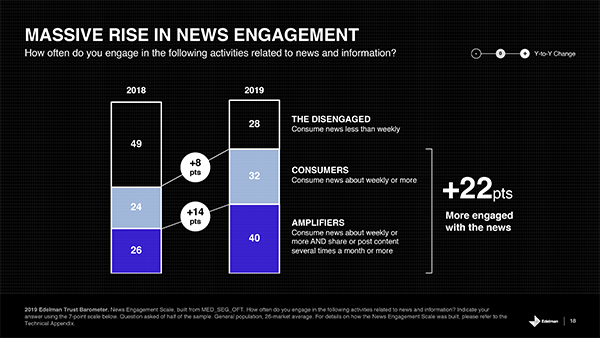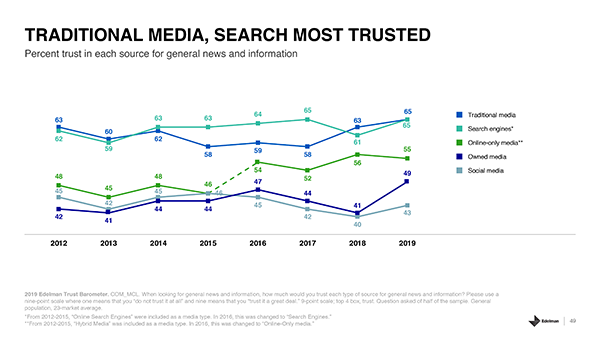
Each year, communications marketing firm Edelman conducts a global study to understand trust in institutions and governments worldwide. Edelman’s new study, released this month, builds on its legacy of assessing how trust impacts brands, market sectors and broader trends by surveying over 33,000 individuals in 27 different countries. While this year’s study probed less into trust in media and journalism than previous years, there are still key findings that the news industry can use.
‘Mass Population’ Increasingly Engaged with News
From 2018 to 2019, there was a 22-point increase in “mass population” engagement with the news. Edelman breaks engagement with news into three groups: The Disengaged (consume news less than weekly), Consumers (consume news about once a week or more) and Amplifiers (who consume news once a week or more and share/post content several times a month or more). The Amplifiers grew from 26 percent to 40 percent of the survey respondents, and the Consumers group grew from 24 percent to 32 percent. This is likely due to large international news stories (e.g. the political situation in the U.S. and other countries, Brexit in the UK and other political/financial stories worldwide). Interestingly, women are more likely than men to have become Amplifiers, which suggests that news organizations may want to prioritize understanding of and outreach to their female readers.
The research also looks at a group of subjects it calls the “Informed Public,” defined by Edelman as individuals ages 25-64 who are college-educated, in the top 25 percent of household income for their country, and report engagement with news and high levels of media consumption. When comparing this group with the mass population, the Informed Public has a higher overall level of trust in key institutions. Specifically, 58 percent of this group worldwide trusts the media to “do what is right.”
Trust in Traditional Tops Other Media Types
Similar to findings shared in the News Media Alliance’s recently-published News Advertising Panorama, the Edelman study shows that around the world, social media is less trusted than “traditional” media sources. In the U.S., Canada and Europe, social media is about half as trusted as traditional sources. In Asia Pacific/Middle East/Africa and Latin America, social media is more trusted than in other regions, but still lags behind traditional media by 10 or more percentage points. The high level of trust in “traditional media” continues from 2018, when trust in this channel surpassed trust in search engines for the first time in five years. Trust in “online-only” media trails traditional sources, but outstrips social media, showing that online consumers do understand the difference.
The good news for media is somewhat undercut by the finding that, in 16 of the 27 markets, a majority of the population distrusts the media. However, in nine of those markets, the percentage who trust the media increased from 2018 to 2019. The global trend was also positive, with an overall 3 percent increase in media trust. There is still work to be done; however, there are many initiatives aimed at increasing public trust in news that want to help ensure the continued upward trend.


